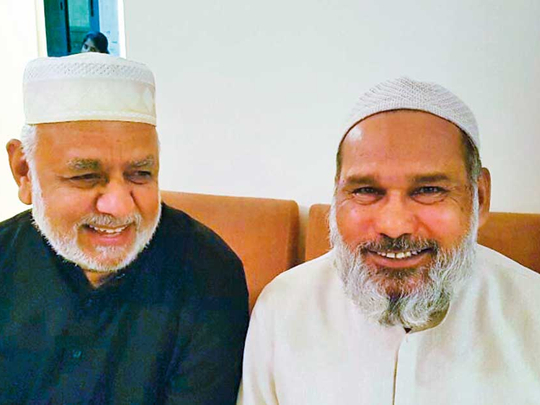
Dubai: It would be difficult to guess that they have been friends for just 11 years, a relationship which my husband and I chose for them by deciding to get married to a person from across the border.
This time, the issue at hand was, who would sit in the front passenger seat.
Our three children were buckled up in their seats and quietly watching the “you first, no, you first” performance being played out by my father and father-in-law. The timer on my phone had clocked a full three minutes.
I don’t remember which one of the two saw my exasperated look first, but it was enough for them to quietly scuttle into the car and settle down.
As was usually the case, my dad lost, but this time because my father-in-law launched the ultimate caveat; he wanted to sit with his “daughter” — me. We’ve been witness to several such incidents in the past where one always puts the needs and comfort of the other first.
“It’s Jaffer Bhai’s simplicity and depth that draws me to him and the fact that we share the same set of values and interests. It’s always fun when we get together,” my father-in-law, Pervaiz Anjum Khan, says.
Evening teas and soulful stories
The compatibility is unmissable. They complete each other’s sentences, manipulate conversations when my husband and I argue — each giving the impression that both he and I are right — and bond over the best in arts and culture.
Has their friendship ever had to undergo the litmus test?
“Of course. I do not make friends very easily and there is always a way to test a person’s character — you can either travel with them, live with them or share a meal with them. I don’t think Jaffer Bhai realised it, but I put him through this test, too, and he passed with flying colours,” Khan says, with a hearty laugh.
Dad says he knew. “I just let him think he was smarter. I was testing him, too, but the criteria was not as intense. I just wanted to gauge his taste in music,” my father, Jaffer Ali Mirza, says.
Often, our evenings at home are accessorised with music from ghazal maestros, steaming hot cups of tea and soulful stories.
Most importantly, they are “always on the same page”. And that was the case 66 years ago, too, when they were born.
The events they recall as leading to the partition are few and far between.
However, based on the narrative shared by elders who were part of the experience, their views on the incident — in light of the current political scenarios — are the same.
“It is time to move on, together and as individual nations. Partition is now history. The purpose was not just freedom from British rule but also to establish Pakistan as a fully independent Muslim state. It was a good start but somehow we have ended up becoming slaves of our stereotypical mindsets,” Khan says.
Mirza says “you cannot wish away the past but the future generation has the choice to change how the story ends.”
“I sometimes wish the partition had not happened but again it is the physical division of a piece of land. We need to make the most of our shared past, but in the right direction and keeping the interests of both countries in mind,” he adds.
As champions of social media in both our households, the two believe these platforms “can empower the future generation to decide how we move on”.
“Today’s generation is far more tolerant. They have Facebook and Twitter and WhatsApp to convey messages to each other, which they can use judiciously,” Mirza says.
Warmth of the people
Khan has never been to India, but says it would have been a regret had he not met Mirza.
“To me, Jaffer Bhai represents the warmth of a lot of people in India and I hope that I am able to do the same for him from here, in Pakistan.”
That’s something that Mirza can vouch for when he travels to Lahore in October to meet “his brother”.
I often tease them that, had it not been for my husband and I, they would have probably never met.
And reminding me of his role in my life, my often reticent father retorted recently, “Neither would you”.












